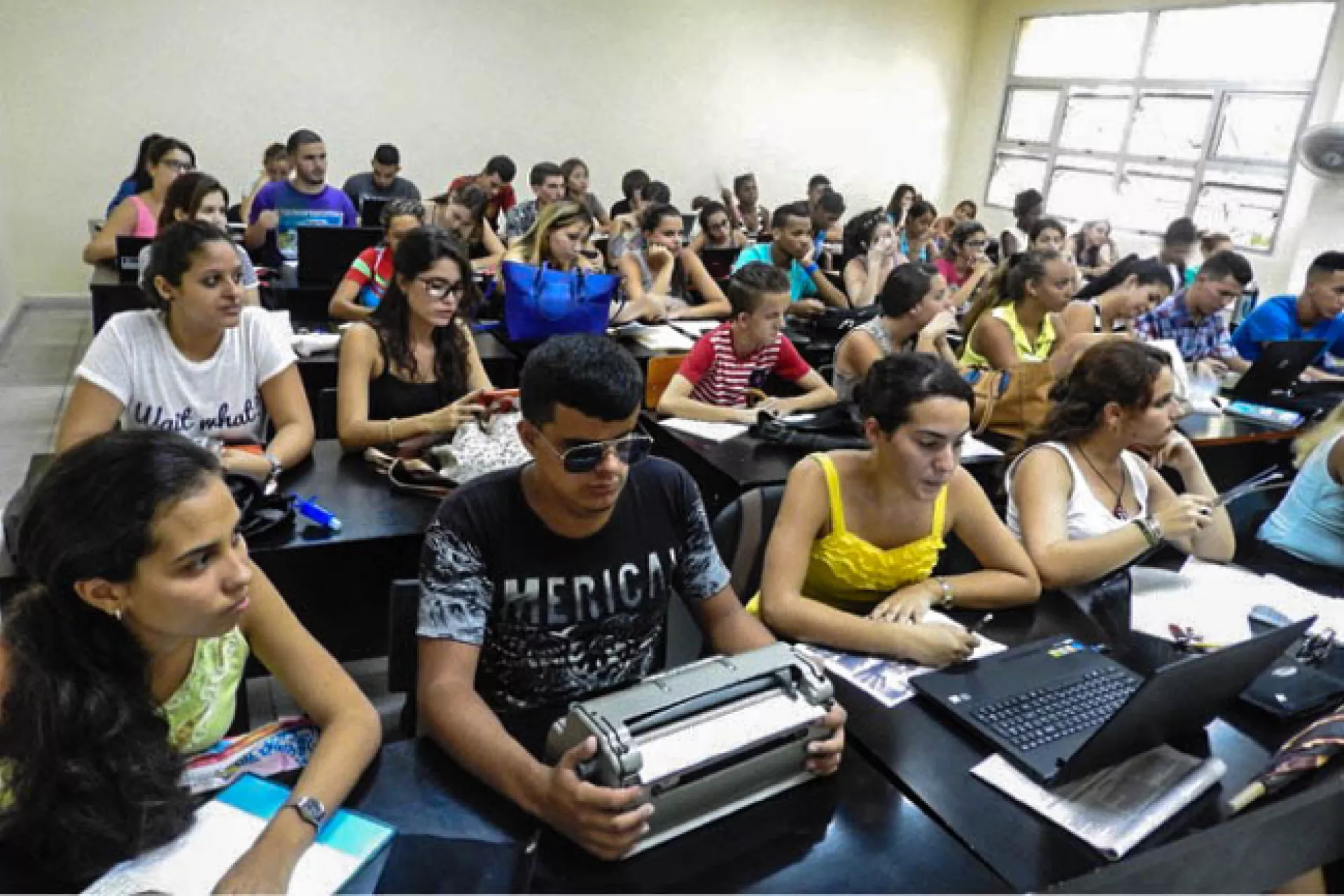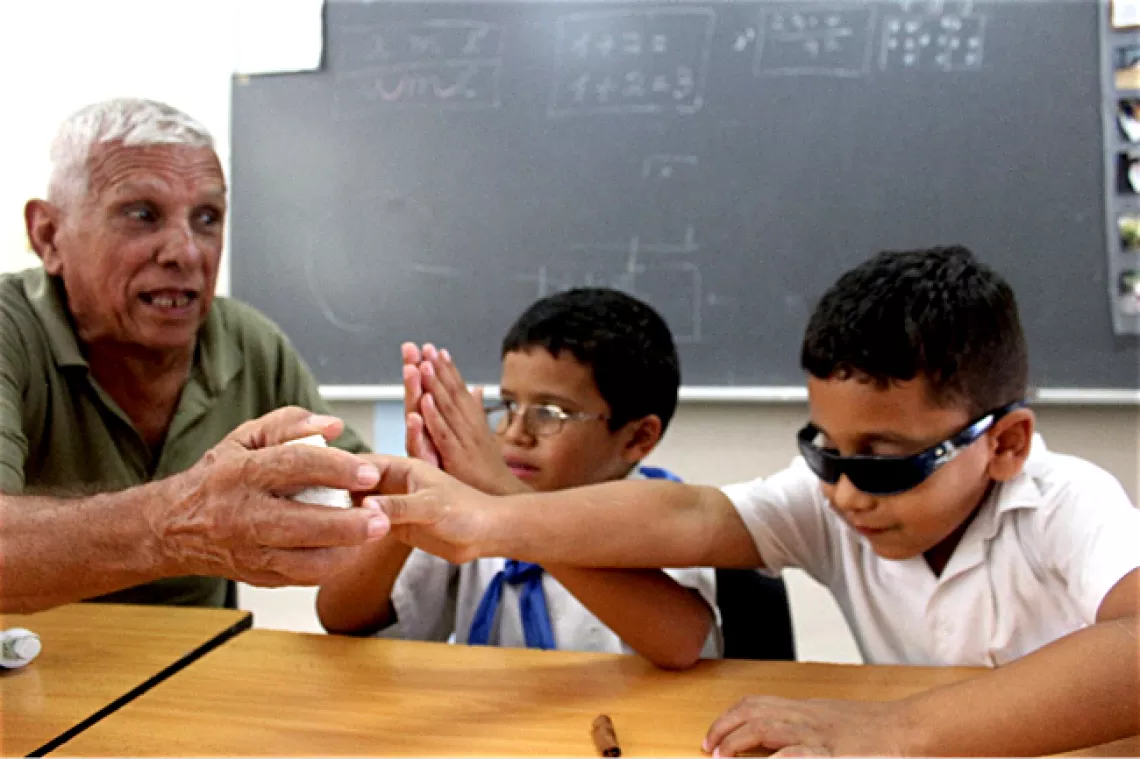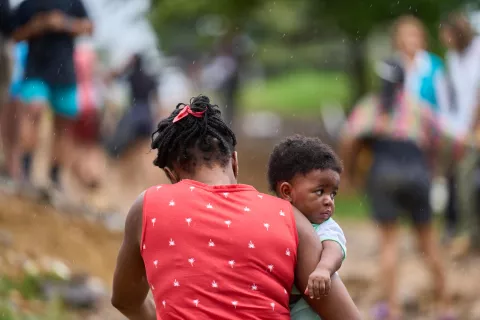Learning without limits: Inclusive education gives children room to grow in Cuba
“I dream that things are happening, that I talk to people, I'm not sure whether ‘I see’ or ‘I don’t see’. I only know that I dream.”

HAVANA, Cuba, 2 November 2016 – Reinier has a rapid and forceful response to everything. At the age of 18, his curiosity for everything and everyone around him keeps him suspended between illusion and absolute uncertainty – as can happen with any teenager. But he is not concerned about the future; he knows that if he has managed to get this far, he can do anything.
“I was born blind so for me it is normal not to see,” says Reinier. “For those who lose their vision at my age, it is much more difficult, of course. I've developed as I was growing up, with the support of my family.”
Claribel, his mother, has been his most faithful and extraordinary companion since he was born. She has taught him the most important lesson of his life: that his development and his dreams, just like any other child, have no limits.
For nine years, Reinier attended the Abel Santa María special school, where he learned all he needed to advance to a mainstream school. In Cuba, the temporary nature of the special schools is designed to serve as a transition towards integration into mainstream education. At Abel Santa María School he learned to use a cane, identify colours, play the guitar, play the piano and ride a bike. He also learned history, arithmetic and geography.

Professor Carlos Bartolomé works with students at the Abel Santa María special school. He has dedicated his life to teaching boys and girls with visual impairments to function in their environments.
His professor, Carlos Bartolomé, has dedicated his life to teaching boys and girls with visual impairments to function in their environments. “I give them the tools to be independent, so that they can move by themselves. And they do it. They are children, they are capable of anything.”
When he moved to the mainstream school, where he would do three years of ‘pre-university’, Reinier felt challenged. “I had to insert myself. All the teachers and students were new to me, I was the only different student with different needs,” he says. “Many of the teachers didn’t have experience with students like me, but soon they began to show interest, improving their methods, and I felt at home.”
Nearly 10,000 children with disabilities study in mainstream schools in Cuba. Sometimes their teachers lack inclusive training and teaching tools, and cannot offer the necessary support to help these children to achieve their educational objectives. UNICEF contributes to the inclusive training of these teachers and raises awareness among the families.

José Humberto Perez stands with Reinier. Mr. Perez was Reinier's teaching guide during pre-university school.
José Humberto Perez was Reinier’s ‘teacher guide’ during his first year – a person who is in charge of observing and adapting the dynamics in class, so that the environment for the student with disabilities is appropriate and safe.
“I recognized that at first the ‘taca’ of his [braille] machine bothered me – well, bothered everyone in fact,” he says. “It was necessary to raise awareness to the classroom, but after a few weeks Reinier and his sense of humour had already made many friends.”
In the Cristino Naranjo pre-university, they still remember when a teacher guide found Reinier alone outside of classroom during an exam. When he asked Reinier with concern why they had left him out, he replied that they had caught him looking.

Reinier types on his braille typewriter during class. It took his classmates a little while to adjust to the sound of the typewriter, but they soon grew accustomed to it and welcomed Reinier like any other student.
Reinier spent three years working hard – so hard that he became the only student in his class to graduate with a Diploma of Gold, the highest academic distinction. During those years he particularly enjoyed computers, and had an impressive proficiency in the software JOS, which, through a voice synthesizer, locates all the options available in the computer. Chess and word processing became his favourite activities. Reinier had also been a broadcaster at many school activities, and he felt more at ease in the role than other students. He knew then that he wanted to be a journalist.
Without thinking twice, he applied to the University of Havana to study journalism. After spending the spring full of nerves, he learned that he had been admitted. Reinier began his studies at the Faculty of Journalism in September, together with more than 40 students. Gone are the days when the special school minibus (guagua) picked him up and dropped him at home every day. Now, going to the Faculty is part of a new adventure, which he enjoys with his father.
“Before, I stood out – I was the only different one,” he says. “Here I have to work very hard, there is more participation, more competition, more culture. I'm not the only one; at the University we are all different.”
Today, Reinier is one of the first to arrive in the classroom and takes a place in the front row. His companions are not yet accustomed to the ‘taca-taca’ of his old braille typewriter, which he soon hopes to replace with a laptop. He uses the typewriter to take notes, and even to sit on in the hallway.
“It’s made of steel, isn’t it? So it can do many things,” he laughs.



